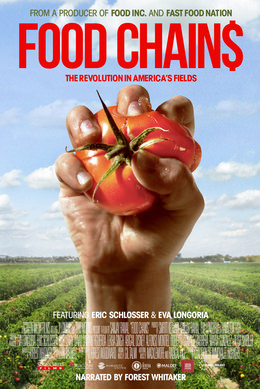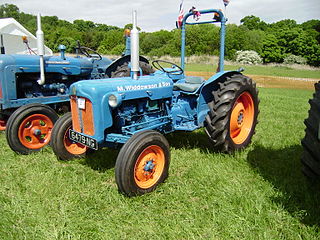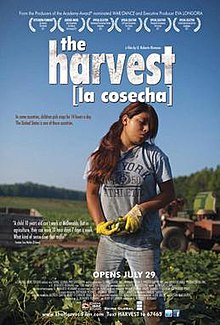
Agriculture is a major industry in the United States, which is a net exporter of food. As of the 2017 census of agriculture, there were 2.04 million farms, covering an area of 900 million acres (1,400,000 sq mi), an average of 441 acres per farm.

The United Farm Workers of America, or more commonly just United Farm Workers (UFW), is a labor union for farmworkers in the United States. It originated from the merger of two workers' rights organizations, the National Farm Workers Association (NFWA) led by César Chávez and Dolores Huerta and the Agricultural Workers Organizing Committee (AWOC) led by organizer Larry Itliong. They allied and transformed from workers' rights organizations into a union as a result of a series of strikes in 1965, when the Filipino American and Mexican American farmworkers of the AWOC in Delano, California, initiated a grape strike, and the NFWA went on strike in support. As a result of the commonality in goals and methods, the NFWA and the AWOC formed the United Farm Workers Organizing Committee on August 22, 1966. This organization was accepted into the AFL–CIO in 1972 and changed its name to the United Farm Workers Union.

Lucille Elsa Roybal-Allard is an American politician who served as a U.S. representative from California from 1993 to 2023. A member of the Democratic Party, she first entered Congress in 1993. Her district, numbered as the 33rd until 2003, the 34th from 2003 to 2013, and the 40th from 2013 to 2023, included much of southern Los Angeles, as well as several eastern suburbs, such as Downey, Bell and Bell Gardens. On December 20, 2021, Roybal-Allard announced her retirement at the end of the 117th Congress.

Child labor laws in the United States address issues related to the employment and welfare of working children in the United States. The most sweeping federal law that restricts the employment and abuse of child workers is the Fair Labor Standards Act of 1938 (FLSA), which came into force during the Franklin D. Roosevelt administration. Child labor provisions under FLSA are designed to protect the educational opportunities of youth and prohibit their employment in jobs that are detrimental to their health and safety. FLSA restricts the hours that youth under 16 years of age can work and lists hazardous occupations too dangerous for young workers to perform.

The Bracero Program was a U.S. Government-sponsored program that imported Mexican farm and railroad workers into the United States between the years 1942 and 1964.

Harvest of Shame was a 1960 television documentary presented by broadcast journalist Edward R. Murrow on CBS that showed the plight of American migrant agricultural workers. It was Murrow's final documentary for the network; he left CBS at the end of January 1961, at John F. Kennedy's request, to become head of the United States Information Agency. An investigative report intended "to shock Americans into action," it was "the first time millions of Americans were given a close look at what it means to live in poverty" by their televisions.

A farmworker, farmhand or agricultural worker is someone employed for labor in agriculture. In labor law, the term "farmworker" is sometimes used more narrowly, applying only to a hired worker involved in agricultural production, including harvesting, but not to a worker in other on-farm jobs, such as picking fruit.

The cultivation of tobacco usually takes place annually. The tobacco is germinated in cold frames or hotbeds and then transplanted to the field until it matures. It is grown in warm climates with rich, well-drained soil. About 4.2 million hectares of tobacco were under cultivation worldwide in 2000, yielding over seven million tonnes of tobacco.
Shelley Davis was an American attorney and activist best known for her advocacy of rights and better working conditions for farm workers, particularly child, migrant and seasonal laborers.
Shine Global Inc, is a non-profit media company that was founded in 2005 by Susan MacLaury, and Albie Hecht. Susan MacLaury is the Executive Director of Shine Global. Shine Global has produced projects including War/Dance, a 2008 Academy Award Nominee for Best Documentary and Inocente, the Academy Award Winner for Best Documentary Short Subject in 2013.

The Migrant and Seasonal Agricultural Worker Protection Act, codified at 29 U.S.C. §§ 1801-1872, is the main federal law that protects farm workers in the United States and repealed and replaced the Farm Labor Contractor Registration Act.

Pineros y Campesinos Unidos del Noroeste, more commonly known by the acronym PCUN, is the largest Latino union in the U.S. state of Oregon. PCUN is located in Woodburn. According to the Statesman Journal, the meetings that led to the formation of PCUN were held at Colegio Cesar Chavez, the nation's first fully accredited and independent Latino college. PCUN was founded in 1977 by Cipriano Ferrel, who graduated from Colegio Cesar Chavez and worked closely with Cesar Chavez himself. Ferrel was motivated to create the organization after an increase in immigration raids in Oregon. PCUN has organized the creation of migrant housing and farmworker housing. Cipriano Ferrel worked closely with Cesar Chavez.
The "Faces of Freedom" photo exhibition is a collection of photographs captured by photo-journalist, filmmaker and human rights educator U. Roberto (Robin) Romano, during his travels to India, Nepal and Pakistan. Romano explores the exploitation of child labor in the production of handmade rugs in coordination with multiple international organizations, such as the World Bank, UNICEF, International Labour Organization and others to reduce the number of child laborers in that industry. The exhibit has been shown in many United States cities since its first exhibit in 2009. Faces of Freedom has been included in CNN Freedom Projects of modern slavery.
Children's Act for Responsible Employment (CARE Act) is a United States bill that would address the labor conditions of child field workers by imposing the same age, work hour, and pesticide exposure limits as other occupations and increasing the penalties for child labor violations. Representative Lucille Roybal-Allard introduced the Children's Act for Responsible Employment (CARE Act, HR 3564) bill in September 2009 and has subsequently reintroduced it.

Food Chains is a 2014 American documentary film about agricultural labor in the United States directed by Sanjay Rawal. It was the Recipient of the 2015 James Beard Foundation Award for Special/Documentary.

Agricultural safety and health is an aspect of occupational safety and health in the agricultural workplace. It specifically addresses the health and safety of farmers, farm workers, and their families.
U. Roberto Romano (1956-2013), also known as Robin Romano, was an American documentary filmmaker, producer, photojournalist and human rights activist. He is known for directing Stolen Childhoods (2005), The Dark Side of Chocolate (2010) and The Harvest/La Cosecha (2010) and for campaigning against exploitative labor practices. In addition to filmmaking, Romano's photography documented child and migrant labor worldwide. The Romano archives are housed at the Thomas J. Dodd Research Center at the University of Connecticut.
Marion Theresa Moses was an American physician, nurse, and labor activist, closely associated with Cesar Chavez.

Farmworkers in the United States have unique demographics, wages, working conditions, organizing, and environmental aspects. According to The National Institute for Occupational Safety & Health in Agricultural Safety, approximately 2,112,626 full-time workers were employed in production agriculture in the US in 2019 and approximately 1.4 to 2.1 million hired crop workers are employed annually on crop farms in the US. A study by the USDA found the average age of a farmworker to be 33. In 2017, the Department of Labor and Statistics found the median wage to be $23,730 a year, or $11.42 per hour.
María Elena Lucas is a Chicana migrant farm worker, labor rights activist, poet, diarist, storyteller and playwright. She founded the United Farm Workers' Service Center in the North American Midwest, organizing day care, a health clinic and other services. She was vice president of the Farm Labor Organizing Committee (FLOC). Her activism was curtailed when she and her oldest son were poisoned by pesticides.













